Rosencrantz & Guildenstern Are Dead
Written by Tom Stoppard
Directed by Gerard Bourke
Performed in the
Gardens of Airfield House, Dundrum - from Saturday 18 to Tuesday 21 June 2011
and at the Mill Theatre on Thursday 23 June 2011
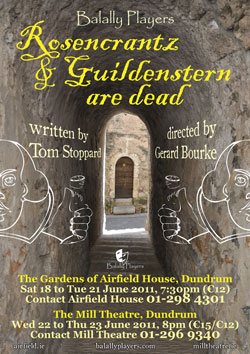
Director Gerard Bourke and his troupe of players performed this humourous, alternative take on a couple of Shakespeare's characters during the month of June 2011. It was a departure from the usual 'Summer Shakespeare' that the group has performed under the midsummer sky at Airfield for many years.
The play, which was written by Tom Stoppard, is based on a one-act play he wrote in 1964 called 'Rosencrantz and Guildenstern Meet King Lear'. He rewrote that, expanded it into three acts and changed its title to 'Rosencrantz and Guildenstern Are Dead'. The new play was first performed at the Edinburgh Fringe Festival in 1966. A very successful production at the National Theatre in London in 1967 was followed by an equally well received debut on Broadway in the same year. The play and playwright won several awards including the Evening Standard Award for Most Promising Playwright in 1967, the Plays and Players Best Play Award in 1967 and a Tony Award for Best Play in 1968.
Like 'Shakespeare in Love', 'Rosencrantz and Guildenstern Are Dead' dips deeply into the Elizabethan era for its dramatic and comedic material.
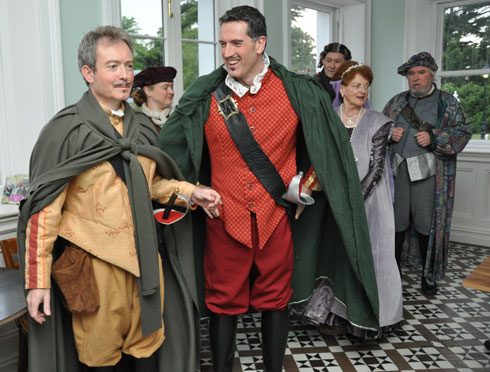
The two characters, Rosencrantz and Guildenstern, have minor roles in Shakespeare's Hamlet, a play written around 1600. In Tom Stoppard's play, Rosencrantz and Guildenstern wander through a featureless wilderness, flipping coins, which keep coming up heads. Each time a coin lands on heads, Rosencrantz wins it. While Guildenstern is puzzled and concerned about the improbability of a coin landing heads up as frequently as this one does, Rosencrantz continues tossing the coin. Guildenstern begins to think that they are in a world where the laws that govern the real world somehow no longer apply to them. Nature's rules that control how time works and the chaos that makes things happen by chance are curiously split apart and upside down - and so the stage is set for a very literate, clever and funny play.
This pair struggles to recall why they are traveling and remember only that a messenger called them. They encounter a troupe of actors, known as the Tragedians. The leader of the group, called the Player, indicates that the Tragedians specialize in sexual performances and gives Rosencrantz and Guildenstern the chance to participate for a fee. Guildenstern turns the improbable coin-flipping episode to their advantage by offering the Player a bet. The Player loses but claims he cannot pay. Guildenstern asks for a play instead. Guildenstern starts to leave as the Tragedians prepare, and Rosencrantz reveals that the most recently flipped coin landed tails-up.
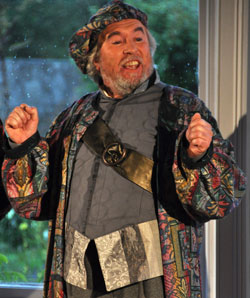
Brendan Dunne as 'The Player'
Rosencrantz and Guildenstern are two minor characters in Hamlet, a play written around 1600. Shakespeare's most famous tragedy tells the story of the prince of Denmark, Hamlet, who may or may not be going insane. As the play opens, the ghost of Hamlet's father visits Hamlet to say that he was murdered by Claudius, Hamlet's uncle. Claudius has not only become king of Denmark but has also married Hamlet's mother, Gertrude. Hamlet pretends to be insane to trick Claudius into believing that he is safe, but, as the play progresses, Hamlet's anger and revenge fantasies may actually drive him insane. Claudius sends for Rosencrantz and Guildenstern, two childhood friends of Hamlet, to watch over Hamlet, but Hamlet does not confide in his friends, confuses them with riddles, and eventually sends them to their deaths. Hamlet also convinces a group of actors to perform a play that closely mimics the murder of Hamlet's father, and the play greatly disturbs Claudius, who decides to send Hamlet to England under the care of Rosencrantz and Guildenstern. Hamlet escapes, goes back to Elsinore, and dies, as do most of the other characters. Stoppard borrows heavily from Shakespeare, not only re-imagining the play's plot but also quoting directly from Hamlet whenever his Rosencrantz and Guildenstern characters speak to Claudius, Gertrude, Hamlet, or Polonius.
Tom Stoppard

Tom Stoppard was born Tomas Straussler to a Jewish family on July 3, 1937, in Zlín, Czechoslovakia. He fled with his parents to Singapore in 1939 to escape the Nazis. A few years later, at the height of World War II, he went with his mother and younger brother to India to escape the invading Japanese. His father, a doctor, stayed behind in Singapore but later drowned on his way to join his wife and sons. In India, his mother met and married Kenneth Stoppard, a major in the British army. Along with his stepfather, mother, and brother, Stoppard moved to Bristol, England, in 1946, just as India declared its independence from Britain. By all accounts, Stoppard wholeheartedly embraced British culture and eventually ceased to speak Czech. A love of English wordplay and constant references to English literature run throughout his literary output, which includes plays, screenplays, and fiction.
While 'Rosencrantz and Guildenstern Are Dead' remains Stoppard's most famous play, his other work has garnered critical acclaim and won several awards. In all, Stoppard has written more than twenty plays. Most are performed in both London and New York City, the two epicenters of theater. Critics generally cite Jumpers (1973) and Arcadia (1993) as his best plays.
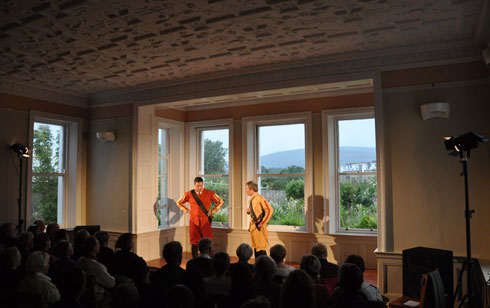
Rosencrantz and Guildenstern in the Library of Airfield House.
The very wet weather, a feature of the month, moved the performance on Midsummer's Night, Tuesday 21 June, from the gardens to the library at Airfield House (above).
|
Rosencrantz Guildenstern The Player Hamlet Claudius Gertrude Polonius Ophelia Alfred Player King Poisoner King Player Spy Norwegian General Danish Guard / Norwegian Captain |
Brendan O'Sullivan Gerry Clabby Brendan Dunne Kevin O'Flynn Michael Sharp Mary Ryan Tony McGettigan Orla Cooney Caroline Williams Lorcán Dunne Fintan Cooney Eoghan Boyle Tony McGettigan Seán T Daly |
|
Director/Set design Costume designer Sound designer Lighting designer Production Manager Stage Manager ASM Publicity Properties Set Construction Set Construction Make up artist Programme design Programme content Poster design Box Office Front of House |
Gerard Bourke Dympna Murray Mark McLoughlin Paul Macken Peter Flood Orla Fitzpatrick Niamh Daly Len Nealon Orla Fitzpatrick Pat Hand Darren McBride Teresa Dempsey Kevin O'Flynn Mary Ryan Declan Brennan Jean Monahan Fiona Walsh Deirdre Mullen |
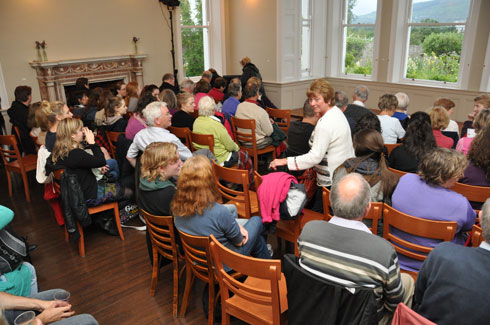
The audience before the performance in the Library of Airfield House on 21 June 2011 (Midsummer's Day).
Picture Gallery
Photographs from productions are stored on the SmugMug.com site. The Balally Players SmugMug account allows for the viewing and downloading of images at various sizes if high resolution pictures have been uploaded. The slideshow below can be run and stopped by clicking on the play (>) and pause (¦¦) icons. You can move forward and back by clicking on the right or left of the image. To go to the gallery of these images stored in the Balally Players pages of the SmugMug site, where you can see and download larger copies of the images, visit www.balally.smugmug.com to see all of the available galleries of images.
 Gerard Bourke (director) and Mark McLoughlin (sound) |
 Sean Daly, Orla Cooney and Brendan Dunne |
 Caroline Williams (front) with Lorcan Dunne, Mary Ryan, Fintan Cooney, Eoghan Boyle |
 Mary Ryan and Michael Sharp |